Hope Hicks breaks down at Trump trial as she testifies about Michael Cohen
A chief aide who gave voice to Donald Trump’s chaotic 2016 campaign for the presidency broke down in tears on the witness stand in his hush money trial, moments after she testified about payments to an adult film star whose allegations threatened to derail his campaign.
The emotional moment from Hope Hicks inside a Manhattan criminal court on Friday followed revealing testimony about her damage control in the weeks before Election Day, and her behind-the-scenes public relations efforts to salvage Mr Trump’s campaign while stories about his alleged affairs and vulgar comments about women were piling up.
Ms Hicks – the first major figure within Mr Trump’s orbit to testify in the trial, which concluded its second week of testimony on Friday – turned her face away from the court and dabbed her eyes with a tissue as she began to cry. Microphones on the witness stand picked up the sounds of quiet sobs.
Moments earlier, she said that Mr Trump had told her that his former attorney Michael Cohen “felt like it was his job to protect him.”
Cohen wired Stormy Daniels $130,000 weeks before Election Day in 2016, and a series of reimbursement payments from Mr Trump in the months that followed are now at the center of a criminal case against the former president.
Mr Trump is charged with 34 counts of falsifying business records for allegedly covering up those payments as “legal expenses” in an effort to boost his chances of winning the election. He has denied the affairs and pleaded not guilty.
“He did it in the kindness of his own heart and he didn’t tell anyone about it,” she said, recalling what Mr Trump told her in 2018 about Cohen’s payments.
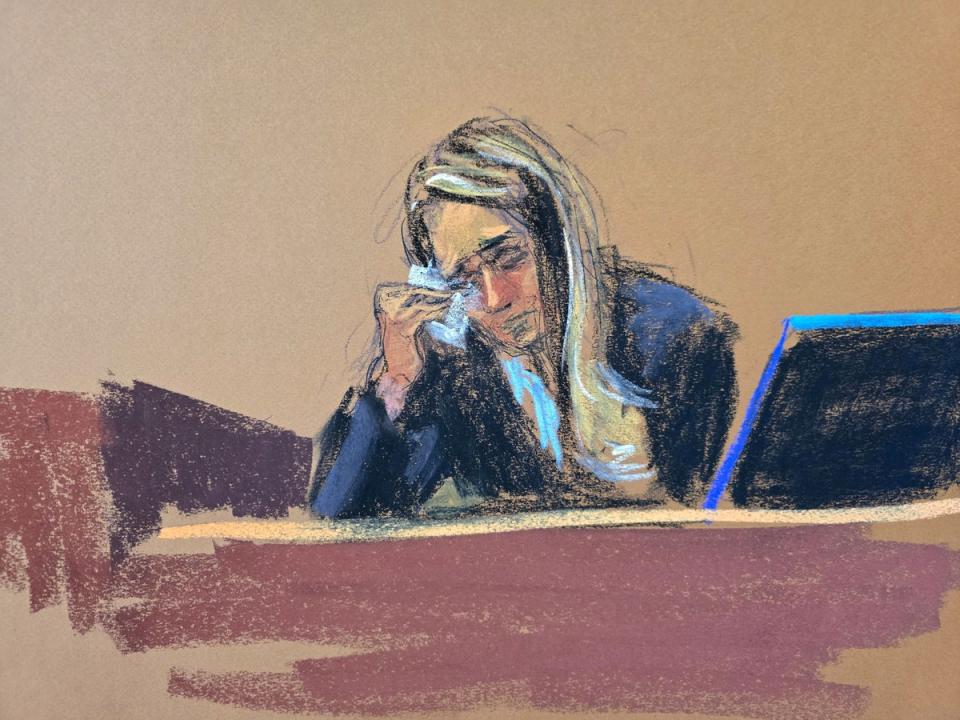
Asked by the prosecution whether she believed that Mr Trump’s description of Cohen was consistent with what she knew about him, she said: “I’d say that would be out of character for Michael.”
“I didn’t know Michael to be an especially charitable person, or a selfless person,” she said. “The kind of person who seeks credit.”
Defense attorney Emil Bove was only moments into a benign series of questions about her work history before she broke down. New York Justice Juan Merchan asked if she needed a break.
“Yes, please,” she said.
Mr Bove’s line of questions stood in stark contrast to his rapid-fire and often aggressive approach to other prosecution witnesses.
To Ms Hicks, he spoke slowly, with a low and soft voice, attempting to pull out of her a sense that things in Mr Trump’s business and campaign were stable, that damage control over destructive stories are part of the job, and that Mr Trump ultimately cared about his family – an echo of the portrait of the former president as a consummate family man introduced in opening statements.
Ms Hicks also changed how she spoke about him: “President Trump.”
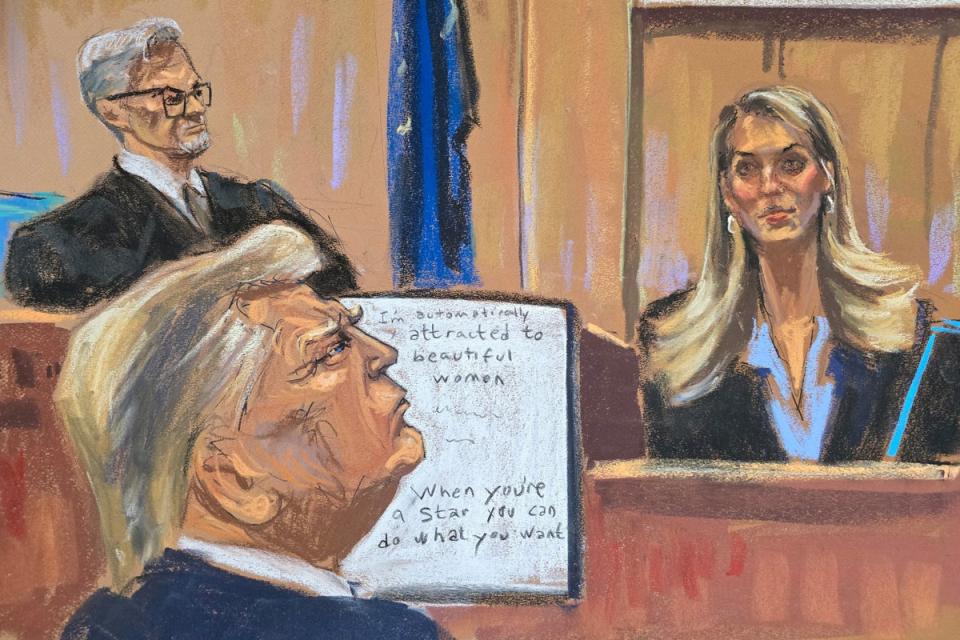
Ms Hicks, who has not spoken to Mr Trump since 2022, was a former communications director of the Trump Organization who went on to work for his campaign and then the White House.
She left the administration in 2018 and returned in 2020.
Days before a presidential debate, and less than one month before Election Day in 2016, a recording of Mr Trump bragging about grabbing women’s genitals sent shockwaves through his campaign, according to testimony from Ms Hicks.
She said that the release of the Access Hollywood tape was a “damaging development” that threatened to derail the campaign in a busy and critical period before the election.
She was “stunned,” she said from the witness stand on Friday.
“It’s hard to describe,” Ms Hicks said. “It was definitely concerning. And I had a good sense that this was going to be a massive story and sort of dominate the news cycle for the next several days, at least … It was a damaging development.”
The story was “kind of pulling us backwards, and it was going to be difficult to overcome,” she said.
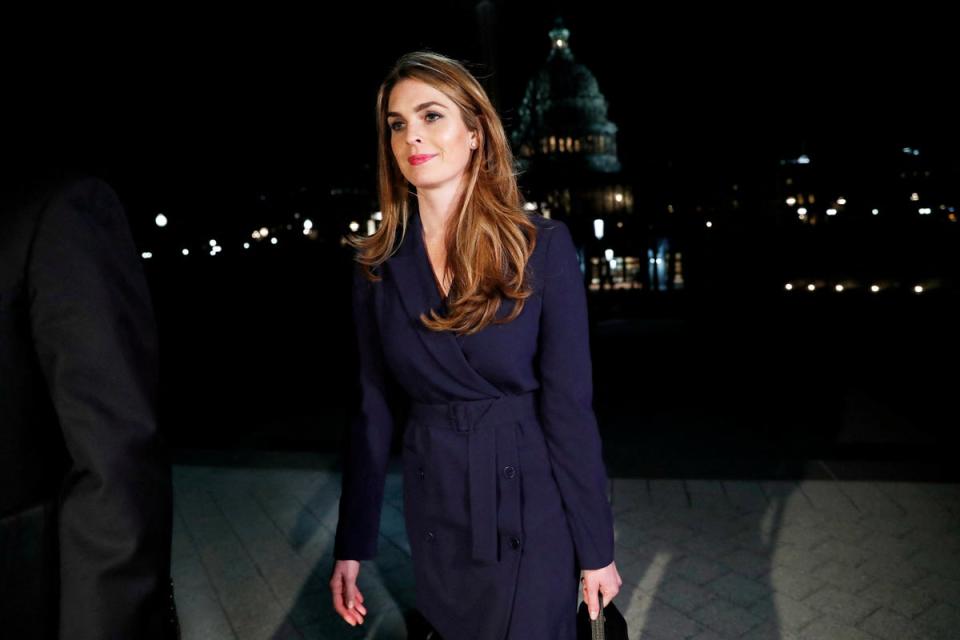
Manhattan prosecutors have argued that the tape’s release fuelled Mr Trump’s attempts to bury any other politically compromising stories involving allegations of his affairs, ultimately leading to an urgent deal to buy the rights to allegations from Ms Daniels, who claimed to have had sex with Mr Trump a decade earlier.
That deal was finalised just weeks before Election Day.
Ms Hicks, who was working as a press secretary for Mr Trump’s campaign at the time, was in her office on the 14th floor of Trump Tower in New York when she received an email from a reporter from The Washington Post asking for comment about the contents of the Access Hollywood tape.
She forwarded the email to campaign officials Jason Miller, David Bossie, Kellyanne Conway and Steve Bannon.
“FLAGGING,” she wrote. “1. Need to hear the tape to be sure 2. Deny, deny, deny”.
“It’s a reflex,” she said with a laugh on Friday. “I was obviously a little shocked and had not realized that the entirety of the transcript was in the email.”
That tape, recorded in 2005, captured Mr Trump saying that he “moved” on a female TV personality “like a b****”.
“I’m automatically attracted to beautiful... I just start kissing them,” he says on the tape. “It’s like a magnet. Just kiss. I don’t even wait. And when you’re a star, they let you do it. You can do anything. Grab them by the p****. You can do anything.”
The media reaction “was intense” and “dominated coverage for I would say 36 hours leading up to the debate” that weekend, Ms Hicks said.
“At the time I got the email … we were anticipating a Category 4 hurricane making landfall somewhere on the east coast,” she said. “And I don’t think anyone remembers where that hurricane made landfall.”
Assistant District Attorney Matthew Colangelo repeated that testimony back to her.
“The Access Hollywood tape pushed the hurricane off the news?” he said.
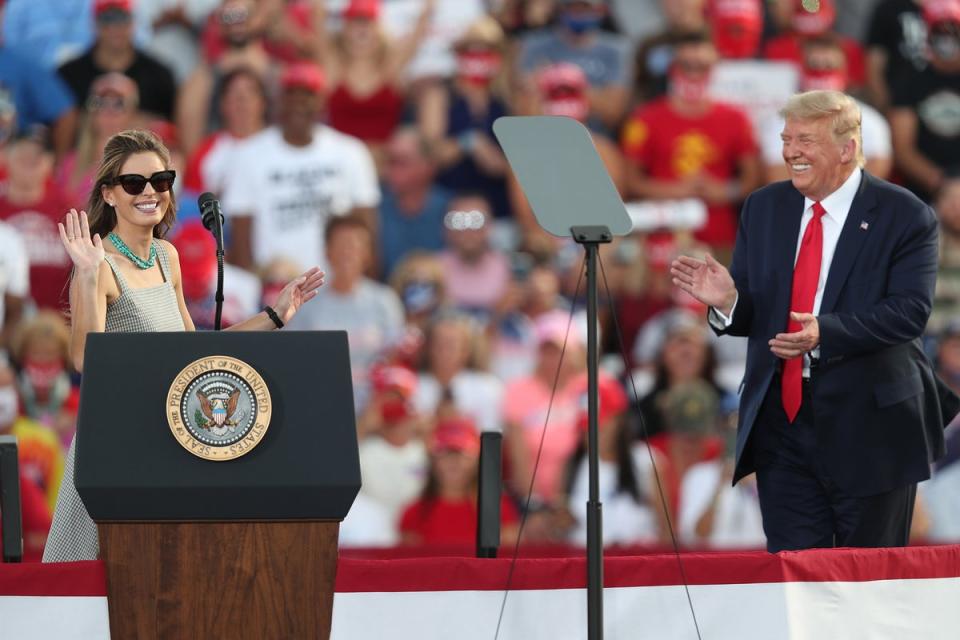
Mr Trump lost endorsements and other Republican officials began themselves from him after the tape’s release, Ms Hicks testified.
The campaign, meanwhile, produced statements calling the tape “locker room talk,” while Mr Trump at his rallies he called brewing allegations against him “horrible lies” and “fabrications, and we can’t let them change the most important election of our lives.”
Four days before Election Day, The Wall Street Journal published details of a scheme arranged with Cohen, Mr Trump and former National Enquirer publisher David Pecker to buy the rights to allegations from former Playboy model Karen McDougal, who claimed to have had an affair with Mr Trump.
Those allegations were never published and the story was buried for the price of $150,000, paid by Mr Pecker months earlier, according to records shown in court.
Mr Trump adamantly denied the affair in his conversations with Ms Hicks, she said on Friday.
The Wall Street Journal article quotes her as saying “we have no knowledge of any of this” and that any claim of an affair was “totally untrue.”
“I don’t remember him verbatim saying that but that was the consensus of the conversations we were all having,” she testified.
Mr Pecker previously testified that Mr Trump and Cohen were intimately involved in efforts to bury the story, and a recording played to jurors earlier this week revealed Mr Trump asking about “financing” the scheme.
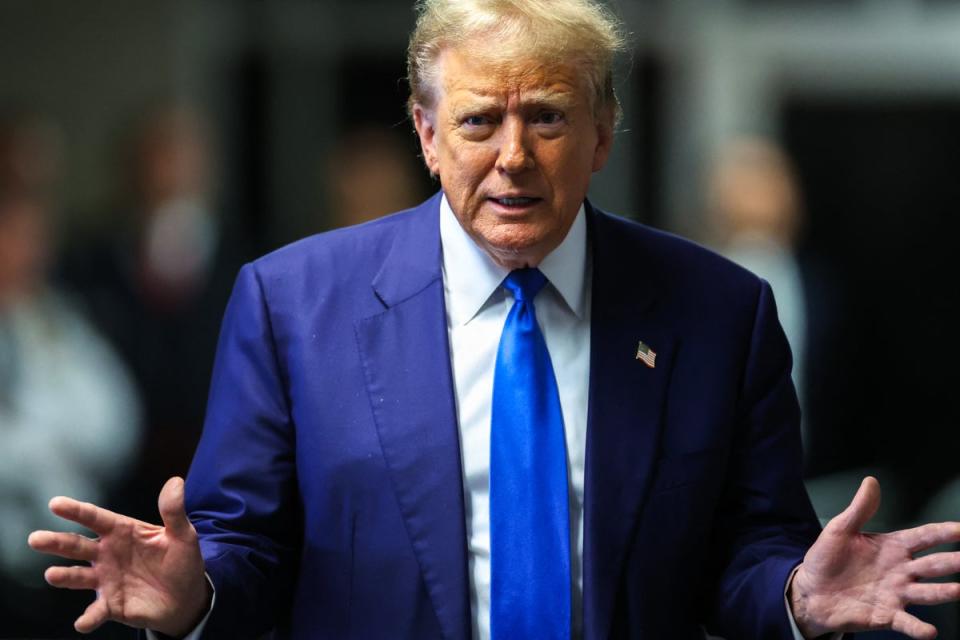
That story also mentioned allegations involving Ms Daniels.
“He was concerned about the story,” Ms Hicks said about Mr Trump’s reaction.
“He was concerned how it would be viewed by his wife, and he wanted me to make sure that the newspapers weren’t delivered to their residence that morning,” she said.
Under questioning from the defense, Ms Hicks said that Mr Trump “really values Ms Trump’s opinion.”
“She doesn’t weigh in all the time but when she does it’s really meaningful to him and he really respects what she has to say,” she said.
“[Mr Trump] didn’t want anyone in his family to be hurt or embarrassed,” she said. “He wanted them to be proud of him.”


